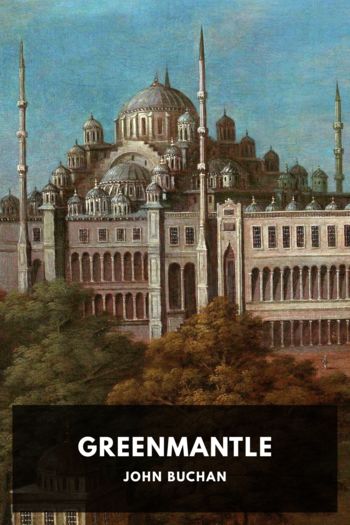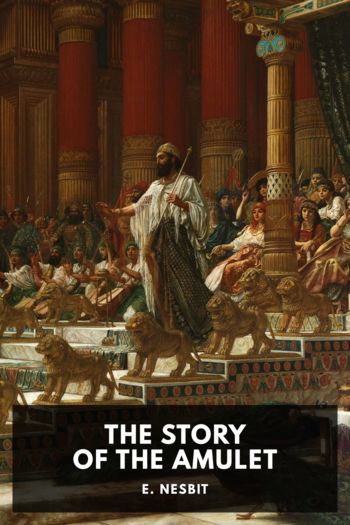Greenmantle, John Buchan [big screen ebook reader .TXT] 📗

- Author: John Buchan
Book online «Greenmantle, John Buchan [big screen ebook reader .TXT] 📗». Author John Buchan
Darkness fell when we were some miles short of the city, and the last part was difficult driving. On both sides of the road transport and engineers’ stores were parked, and some of it strayed into the highway. I noticed lots of small details—machine-gun detachments, signalling parties, squads of stretcher-bearers—which mean the fringe of an army, and as soon as the night began the white fingers of searchlights began to grope in the skies.
And then, above the hum of the roadside, rose the voice of the great guns. The shells were bursting four or five miles away, and the guns must have been as many more distant. But in that upland pocket of plain in the frosty night they sounded most intimately near. They kept up their solemn litany, with a minute’s interval between each—no rafale which rumbles like a drum, but the steady persistence of artillery exactly ranged on a target. I judged they must be bombarding the outer forts, and once there came a loud explosion and a red glare as if a magazine had suffered.
It was a sound I had not heard for five months, and it fairly crazed me. I remembered how I had first heard it on the ridge before Laventie. Then I had been half-afraid, half-solemnized, but every nerve had been quickened. Then it had been the new thing in my life that held me breathless with anticipation; now it was the old thing, the thing I had shared with so many good fellows, my proper work, and the only task for a man. At the sound of the guns I felt that I was moving in natural air once more. I felt that I was coming home.
We were stopped at a long line of ramparts, and a German sergeant stared at us till he saw the lieutenant beside me, when he saluted and we passed on. Almost at once we dipped into narrow twisting streets, choked with soldiers, where it was hard business to steer. There were few lights—only now and then the flare of a torch which showed the grey stone houses, with every window latticed and shuttered. I had put out my headlights and had only side lamps, so we had to pick our way gingerly through the labyrinth. I hoped we would strike Sandy’s quarters soon, for we were all pretty empty, and a frost had set in which made our thick coats seem as thin as paper.
The lieutenant did the guiding. We had to present our passports, and I anticipated no more difficulty than in landing from the boat at Boulogne. But I wanted to get it over, for my hunger pinched me and it was fearsome cold. Still the guns went on, like hounds baying before a quarry. The city was out of range, but there were strange lights on the ridge to the east.
At last we reached our goal and marched through a fine old carved archway into a courtyard, and thence into a draughty hall.
“You must see the Sektionschef,” said our guide. I looked round to see if we were all there, and noticed that Hussin had disappeared. It did not matter, for he was not on the passports.
We followed as we were directed through an open door. There was a man standing with his back towards us looking at a wall map, a very big man with a neck that bulged over his collar. I would have known that neck among a million. At the sight of it I made a half-turn to bolt back. It was too late, for the door had closed behind us and there were two armed sentries beside it.
The man slewed round and looked into my eyes. I had a despairing hope that I might bluff it out, for I was in different clothes and had shaved my beard. But you cannot spend ten minutes in a death-grapple without your adversary getting to know you.
He went very pale, then recollected himself and twisted his features into the old grin.
“So,” he said, “the little Dutchmen! We meet after many days.”
It was no good lying or saying anything. I shut my teeth and waited.
“And you, Herr Blenkiron? I never liked the look of you. You babbled too much, like all your damned Americans.”
“I guess your personal dislikes haven’t got anything to do with the matter,” said Blenkiron, calmly. “If you’re the boss here, I’ll thank you to cast your eye over these passports, for we can’t stand waiting forever.”
This fairly angered him. “I’ll teach you manners,” he cried, and took a step forward to reach for Blenkiron’s shoulder—the game he had twice played with me.
Blenkiron never took his hands from his coat pockets. “Keep your distance,” he drawled in a new voice. “I’ve got you covered, and I’ll make a hole in your bullet head if you lay a hand on me.”
With an effort Stumm recovered himself. He rang a bell and fell to smiling. An orderly appeared to whom he spoke in Turkish, and presently a file of soldiers entered the room.
“I’m going to have you disarmed, gentlemen,” he said. “We can conduct our conversation more pleasantly without pistols.”
It was idle to resist. We surrendered our arms, Peter almost in tears with vexation. Stumm swung his legs over a chair, rested his chin on the back and looked at me.
“Your game is up, you know,” he said. “These fools of Turkish police said the Dutchmen were dead, but I had the happier inspiration. I believed the good God had spared them for me. When I got Rasta’s telegram I was certain, for your doings reminded me of a little trick you once played me on the Schwandorf road. But I didn’t think to find this plump old





Comments (0)